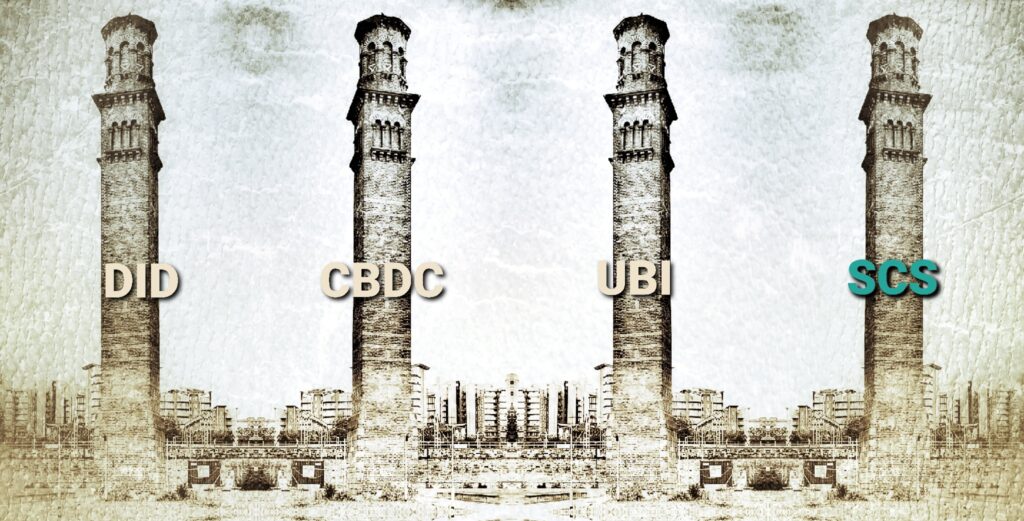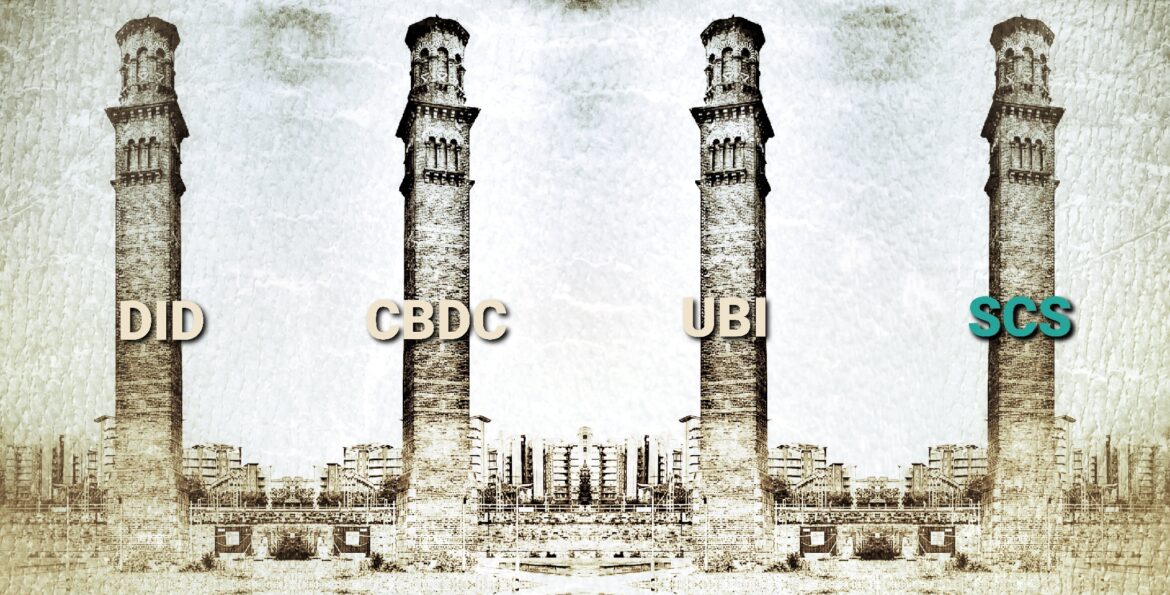– Part Four of ‘The Four Pillars of Control’
Author: Steve Barker

The Social Credit System (SCS) is the second pillar of control.
Pic: & Illustration: Paul Heaney
This is the fourth and final article in this series entitled ‘The Four Pillars of Control, where IT specialist and director Steve Barker explains what he identifies as the key areas of our lives where these technologies are planned to be used. In this article Steve talks about a sinister Chinese type of social profiling or scoring, based on people’s compliance with what big brother wants you to do. And talking of ‘big brother’, it is a model which has been much vaunted by the World Economic Forum, and which, if not checked, would make its ugly way into all our lives. But if you’re not enamoured or sold on the idea of digital everything, everywhere, he happily rounds off with some possible antidotes …
Pillar 4: Social Credit Scoring (SCS)
Once again, I find myself looking to China for a glimpse into the future and what’s to come in our so-called western democracies. China is uniquely placed as a totalitarian state, peppered with alumni of the WEF young leader programme, so that it can act as a proving ground for technocratic control measures. First trialled over seven years ago, SCS is now a reality in around 80% of China. Citizens are encouraged to maintain a high social credit score by following desirable behaviour patterns, with their score being reduced for infringements of the law and anti-state behaviour.
Scores are reduced in proportion to the severity of the crime, starting with minor infringements like dropping litter and being drunk in public, all the way up to tax evasion and anti-state protests, which attract the largest deductions.
This initiative is already being used as a system of punishment, with poor performers having their faces shamed on digital billboards in urban centres, their travel options restricted, and even their choice of available employment limited. In extreme cases, the children of repeat offenders are being denied access to certain schools.
Once again, this is sold to people as the end to crime and public disorder, and the foundation on which a just and honest society can be built. In practice, it is a way to implement complete top-down control over human behaviour. Proponents for such schemes can often be heard parroting the line that those that do no wrong have nothing to fear from such schemes, but are naïve to the fact that the definition of “wrong” is flexible in the hands of their captors.
It is difficult to judge how such schemes are perceived by Chinese nationals, given how advanced China’s own version of Orwell’s anti-thought crimes programmes have become, and how it’s take on Newspeak, installed through generations of a rote-learning and a compliance based education system, is all invasive in its ability to shape thought and speech.
The Chinese SCS system is already integrated with artificial intelligence engines, and the country’s extensive surveillance camera network, meaning that the control can be marshalled autonomously by the authorities.
People in western democracies deceive themselves that no such system would ever be allowed in their homelands, and yet Italy last year announced their intentions to trial a pre-cursor system in Bologna, and closer to home, Wolverhampton trialled a system to give trackers to citizens which rewarded exercise with cinema vouchers.
The fact that InfoSys (a huge Indian IT company with links back to Rishi Sunak through his wife’s father, and also a WEF partner) already runs large projects in China makes me fearful that we’re heading down the same path in the UK faster than one might imagine.
Future developments
I refer to these advancements outlined above as pillars for very good reason. It is my belief that they form a foundation for further control mechanisms. A prime example, regularly referenced in the mainstream media at present, is 15-minute cities. It is no great mental leap to see how much easier they would be to implement with the four pillars in place. It would be simple to prevent subjects making purchases more than a certain distance from their own neighbourhoods if CBDCs were the only form of currency, and DIDs could be used to track travel between districts very easily if they were required at checkpoints.
Those that take arguments regarding man-made climate change at face value will almost certainly vote for the creation of 15-minute cities in the false belief that they will ensure habitable places for their children to live. The authorities clearly think people will accept them, as trials are planned to start in Oxford in the next year or two.
If one mistakenly assumes that our government today is relatively benign and thus, we have nothing to fear in accepting the implementation of the four pillars, consider that governments change. Future rulers may not be so benign and will have the data and the systems already in place to make life very difficult. Certain well-known luminaries like to compare where we’re heading to dystopia portrayed in The Hunger Games series. Implementation of the four pillars is certainly a step in that direction.
Solutions?
Stopping the technological advances outlined above is not going to be easy, but here are some suggestions that might help slow down their adoption at the very least …
The first thing is simply to be aware. Look out for paradigm changes that are sold to us as solutions to problems that mass-media tells us we need to be afraid of, and be suspicious.
As well as being aware, make sure friends and family are aware too. Tell them your concerns about technocratic developments. Many will likely brand you a conspiracy theorist, but it’s only through heightened awareness that we can hope to build a critical mass and defeat or delay these measures.
Although it’s becoming increasingly difficult, I would encourage people to use cash rather than credit cards. This sends a clear message to the Bank of England, and to the government, that they cannot simply phase out physical money.
We need to send a clear message that phasing out physical cash won’t be a frictionless initiative for them. Also consider exploring other forms of money. I personally think Bitcoin is an excellent form of currency which should be seen not as an investment, but as a protest vote against failing fiat currencies. I would thoroughly recommend reading The Bitcoin Standard to educate yourself as to what it’s about. If everyone converted just a few pounds into Bitcoin, it would send another clear message that we’ve had enough of centralised, manipulable money.
To ensure you have a say in how you would like to be compensated for your employment, make sure you join a union where possible. This will give you the power, through safety in numbers, to withhold your employment if you don’t agree with the terms under which your time is being utilised and rewarded.
Think very carefully about signing up for anything that promises rewards for certain behaviours, like the health tracking system they tried to implement in Wolverhampton mentioned above. There is no such thing as a free lunch; you are effectively trading your freedom to act autonomously for something worth a lot less.
Write to your MP and let them know that you won’t be voting for them in future should they decide to support any of the above measures in House of Commons. They need to be reminded that they are our servants, not our masters.
Finally, stay informed about protest marches demonstrating against the introduction of any of the four pillars. The mainstream media won’t tell you where and when these take place, and it certainly won’t report on them after the fact, but you can keep up to date by following organisations like the World Wide Freedom Rally on Telegram. For example, there was a sizeable anti-CBDC protest march in the Netherlands recently, but it was only through Twitter that I was made aware of it.
Large, organised marches can make a difference. They send a message to the government that there are going to many, many unhappy people if certain policies are implemented. A great example is the NHS 100K marches that took place in January 2022 in London. Many thousands of people marched against vaccine mandates for NHS workers, and as a result, the government revoked their policy.
In closing, I recently saw a video on Twitter of a 12-year-old talking at one of the anti-15-minute city rallies in Oxford. Best described as the antithesis of Greta Thunberg, her excellent speech talked about how once planted, seeds will grow, and that is why we need to resist all such control measures now before they are given chance to take root. I suspect some parental involvement in her well delivered words, but the existence of people and families that oppose the current direction of travel so vehemently gives me a glimmer of hope for our future.
– Steve Barker
Links to the previous 3 articles in this analysis of the digital agenda by Steve Barker can be found below.
– Paul Heaney, March 2023
Links to previous articles …
Part 1 … ‘The Four Pillars of Control’ – The Brighter Times
Part 2 … Central Bank Digital Currency (CBDC) – The Brighter Times
Part 3 … Universal Basic Income (UBI) – The Brighter Times
Subscribe
Click here for a secure way to sign up, you will be supporting independent news. Click the button below.
Your Opinions
Disagree with this article? why not write in and you can have your say? email us

